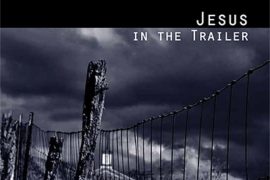For our second micro-essay on first books, Chloe Clark gives us a peek into the inspiration and process behind her debut collection Your Strange Fortune (Vegetarian Alcoholic Press, 2019). This is a book filled with ghosts, folk-tale creatures, dream-like narratives, and desolate settings, all within the context of environmental collapse and disaster. There are poems that weave this environmental uncertainty with personal reminiscences, and there are poems like “I Believed Not in God but in Gods as a Child” where a bleak reality and an even bleaker future lurk just around the corner:
And apocalypse? Apocalypse was just
the fact of life. Those bodies lined up
on the front yard never looked more beautiful than
in that dreamless sleep. Oh they felt so
cold. We washed their hands until they
glistened, kissed
the lips hard of the young men who couldn’t feel it, caressed the brows of the young
women who
couldn’t know it, and blessed them all with names they couldn’t refute.
Images such as these are undoubtedly jarring, but they serve as a reminder of the ways in which we have become desensitized to destruction (war, climate change, etc.), and to the extent we cope with loss on a personal and global level. Your Strange Fortune seeks to chronicle these difficult moods and realities, and it gives us an opportunity to understand the everyday disasters around us, hopefully enough to change for the better.
Esteban Rodriguez
The Making of Your Strange Fortune
In 2016, my dear friend (and at the time roommate) Brontë Wieland and his lovely co-editor Phoebe Wagner decided to work on editing an anthology of solar punk poems, titled Sunvault. Many of my and Brontë’s conversations at the time revolved around the environment, collapse, how awful the world was turning. But we’re both hopeful people and so we also looked toward things that seemed hopeful, the progress that was being made, the way that some of science was being used to help instead of harm the world. I ended up writing some poems, all focused on ways we might look for hope in the face of apocalypse, to submit to the anthology’s open call. Those five poems (two of which appear in Sunvault) started me on the path that eventually led to Your Strange Fortune.
Some of the poems in the book were written purposefully with the ideas of solar punk, apocalypse, and environmentalism in mind, while others came to those ideas naturally. They’re poems of loss as much as longing; harbingers of doom as well as hope. When I began to envision the book as a guide, a way of reading the fortunes of our future (each section uses some kind of fortune/future-telling “device” as the guiding epigraph), it helped me to focus in on what poems needed to be kept or rewritten and which ones didn’t quite fit.
The process of publishing the poems in the book was widespread—in addition to Sunvault, I also sought out venues with a focus on environment and speculative works (such as the awesome journal Reckoning), but I also submitted to other journals that I just loved and hoped would be good fits for my strange pieces. The publishing process was surprisingly delightful. The first time I sent the book out it was a semifinalist in a well-known (and particularly beloved to me) Press contest. I revised the collection once more before submitting again. I ended up submitting and going with the wonderful Freddy LaForce at Vegetarian Alcoholic Press because of the commitment I was seeing to individual artists’ visions and a widespread curiosity that I could tell was behind the press (based on the variety of works being published). The process of working with them has been amazing—supportive and allowing me to go off on all my wildest directions (from making promotional environmental tarot cards to making a short apocalyptic book trailer).
Revising the work, after its acceptance, was a smooth process. I am a kind of obsessive reviser before submitting full works (just ask my novel which has gone through something like 30 revisions at this point) and so there were mostly just minor line edits for the final revision.
I think it’s hard for me to find only darkness in anything I write, and so this book is an ode to what we might try to seek out and reach for—even in the face of everything that goes wrong with the world. The book very purposefully ends on a poem of gratitude. I always hope to have a grateful heart; it’s how I interact with the world, and I hope this book does the same.
Chloe Clark
[/vc_column_text][/vc_column][/vc_row]




